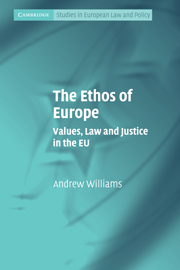1 - The ethos of Europe: an introduction
Published online by Cambridge University Press: 05 June 2012
Summary
Of course temporary agreements are possible between capitalists and between states. In this sense a United States of Europe is possible as an agreement between the European capitalists … but to what end?
Lenin 1915An uncertain ‘soul’
Half a century after the EU was formed there is still doubt and angst about the nature of its constitution. We are perhaps no nearer a clear understanding of what the European Union is for (‘to what end’ in Lenin's prescient terms) or the values that govern its development and practice than we were in 1957. Even though its success, if measured in terms of longevity, ubiquity and political importance, is incontrovertible it remains essentially contested, an ‘unresolved political problem’ depending on perspective. Indeed, the longer time has gone on the more complex the issue has become. As testimony to its extraordinary evolution there now seems to be so much the EU could be as we progress into the twenty-first century. From technocratic facilitator for the enrichment of its members to exemplar for global justice (and an expansive variety in between) the EU might be interpreted as a conceptual chameleon, shifting its purpose depending on the changing political, social, economic and legal environment as well as perspective.
Unsurprisingly, therefore, the EU has always defied easy categorisation. It seems to possess a floating character. One minute an international organisation, the next, a state in the making. Then again a regime that crosses traditional boundaries, an entity that hovers amidst and between different collective regime-types.
- Type
- Chapter
- Information
- The Ethos of EuropeValues, Law and Justice in the EU, pp. 1 - 21Publisher: Cambridge University PressPrint publication year: 2010



